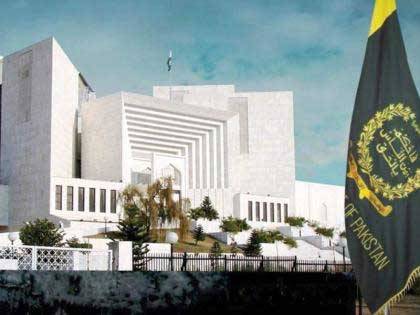ISLAMABAD - Chief Justice of Pakistan Justice Umar Ata Bandial Thursday remarked that the apex court will not allow the Army to take unconstitutional steps.
The CJP made these remarks while heading a six-member bench comprising Justice Ijaz ul Ahsan, Justice Munib Akhtar, Justice Yahya Afridi, Justice Sayyed Mazahar Ali Akbar Naqvi and Justice Ayesha A Malik during the hearing of the petitions against the trial of civilians by the military courts. During the hearing, the Attorney General for Pakistan (AGP) informed the bench that the military’s top officials and the government are seriously considering to provide right to appeal against the verdict of the military court (MC) to the level of high court.
AGP Mansoor Usman Awan said the that serious considerations are being given to deal with the situation at the level of Adjutant General, a 3-Star General. The Adjutant General’s office is the directorate where the rules of Army Act examined. He submitted that in the writ petition against the military courts (MC) there will be limited grounds, therefore he had sought some time for the legal instrument (appeal) is provided through legislation. He added that when the appeal is provided to the high court then the judgment of military courts should be reasonable that could stand in the court of law.
Justice Afridi questioned that why the federation is thinking providing the appeal when the military courts in the meaning of Article 175 are not the court? The attorney general responded that upon the directives of the Chief Justice certain assurances were giving to the Court and this step (appeal) is in light of that to honour those commitments. Awan said that the petitioner Aitzaz Ahsan, remained part of the MRD movement, they also protested and never attacked the military installations, but what happened during four hours on May 9 was for the first time in the history of the country. He said that they (PTI workers) attacked Corps Commander House, Ordnance Factory, Mirage base in Mianwali, adding that the soldiers had the guns and the sophisticated weapons but they did not use them. It is wrong to suggest that first the FIRs should have been registered and the police take against the protest.
Aitzaz Ahsan, who was also standing at the rostrum, said that why the army men stationed at the military installation did not open fire. The AGP responded that the army is for the protection of citizens and they did not want any such situation to kill his own people.
Aitzaz remarked that the appeal will be useless when the person who will conduct the trial is in uniform. He said that they (petitioners) are thinking for the future. He stated that how can the PDM government give assurances when its term will end on August 12. He remarked that whether the government wanted to bring law for 102 people, arrested in the aftermath of May 9 incidents. He questioned what about other civilians who are or will be tried under Army Act. He contended that the Pakistan Muslim League-Nawaz had set up military courts through constitutional amendments. Sardar Latif Khosa submitted that the administration of justice starts with the registration of FIRs. The military courts do not come within the contemplation of Article 175 of the constitution therefore are alien to the judicial system. Aitzaz, Khosa and other petitioners’ lawyers requested the Chief Justice to hear this matter and conclude within this week. However, the CJP said that the members of this bench have to go on summer vacations. Justice Bandial expressing gratitude for their cooperation said; “The court and the country are going through a difficult time, and you have witnessed that. You stretched out helping hand and made this Court function.” He said that whatever happened on May 9 is very serious, adding that never ever want that the members of the Armed Forces shoot our own people, they are to defend the country. He said that the rioters set ablaze a Mirage plane at Mianwali Airbase. He added, “This is very serious.” When Khosa said that even if the Court has to sit on Saturday and Sunday it should do it because the issue is very sensitive. Upon that the chief justice said one member of the bench seriously need to going as he has some personal work, while another member has spent all his holidays here (Islamabad). He further said that there was a further need to hear attorney general’s arguments but contended that the court would not be able to do so for at least two weeks due to the unavailability of judges. “AGP sahib, no military trials of civilians will be conducted,” he told Awan. The latter responded in the affirmative and added that assurances were given over the same. Earlier, during the proceeding, Justice Afridi asked the AGP about his opinion on Article 175 and Article 175(3) of the Constitution, which refer to the establishment and jurisdiction of courts. The AGP responded that “Court martial does not fall under the jurisdiction of Article 175.” At this, Justice Ayesha asked if there was any other provision in the Constitution on the basis of which the AGP was arguing. Justice Munib maintained that fundamental rights could not be left to the “discretion of the legislature”. “It cannot be that House includes some offences in the Army Act while the other removes or adds others offences,” he asserted. “The concept of fundamental human rights is such that the state cannot take them back even if it wants to,” Justice Akhtar pointed out, adding that fundamental rights had been guaranteed by the Constitution. Justice Ayesha also said here that access to justice was a part of fundamental human rights. “If military courts are not courts of law, then trials in them are tantamount to the denial of fundamental rights,” she added.






